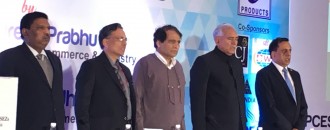
Keeping Her Head Up
Hard work and determination have brought her immense success. A strong believer in helping those who need it most, Dr. Kavita Gupta’s strong work ethics and focused judgement are some qualities that women can emulate in order to achieve their goals.
Aadhira Anandh M. | March 2016 Issue | The Dollar Business
She is a lady who is passionate about her work and one who believes that helping others is one of the most pious ways to live. Meet Dr. Kavita Gupta,
recently appointed Textile Commissioner at the Ministry of Textiles, Government of India. This result-oriented bureaucrat is slated to play a key, developmental role for all round growth of the textile sector, one of the oldest and the largest manufacturing sectors in India. What's on her mind? "We need to bring in more funds into research in this sector. Research enables quantum leaps provided it is commercialised in the right way," she says.
On discrimination against women in government set up and her journey so far she says, “When I was appointed Additional DGFT, I didn’t find anything discriminatory. In fact, I was the first woman to be Principal Secretary, Labour. All I can say is that the journey has been very challenging, and interesting, so far.” When she was at DGFT (Mumbai) she was known for her attempts to bring in transparency at work, the concept of first come first serve, apart from being very approachable at work.
So, how did it all began for this 1985 batch IAS officer of Maharashtra cadre. She initially started out as an engineer, and later shifted her focus to Civil Services. “I completed my engineering from IIT Delhi and then went on to study astrophysics. In IIT, they feel that getting into Civil Service Commission is not a great thing. My teachers thought that I would bring in great inventions. But then, my father asked me that if you discover a galaxy, how would that help the poor in the society? My father is an extremely patriotic man, and he wanted me to do something through which I could serve the society. That is how my focus shifted to Civil Services. My parents are my role models. My father taught me to excel in anything I do, and my mother taught me the value of compassion,” she says.
Kavita is a strong advocate of women empowerment, and has also headed the Women’s Development Corporation in the past. She believes empowerment occurs through improvement of living standards. When you speak to her, you can see the high regard she holds for hard work and excellence, “You have to put your heart, body and soul into your work. Give your 100% to the work you do, and success will follow,” she concludes.
TDB: You joined the Textile Commission last year after being with the Directorate General of Foreign Trade (DGFT). How has been the transition?
Dr. Kavita Gupta (KG): I was Additional Commissioner, Enforcement Sales Tax after which I became the Finance Secretary, and then the Principal Secretary, Labour. Then began my journey with commerce, as the Additional DGFT of Western Zone, which looks after nearly 50% of the country’s exports. And now, I am the Textile Commissioner. The reason for giving the long history is that all along my career, my positions have been augmenting very well. Since textile integrates commerce, labour, and a lot of financial inputs, I can put my experience to work. I can say that the transition has been extremely interesting.
TDB: In March, last year, there was a defamation suit that was filed against you by Riddhi Siddhi Bullion Limited. How do you handle situations like these?
KG: Riddhi Siddhi Bullion is a huge name in the industry. There was a breach of RBI guidelines for which I had to give them a show cause notice. I would like to say they were trying to detract me by confronting me with a huge Rs.500 crore defamation case. It was a challenge to me when this happened. Because I felt that once we face things like this, we are doing the right thing, and fortunately I am a daughter of a General. I have seen my father facing wars, and for me challenges like these are interesting. These situations don’t make me nervous. I have always believed in one principle – if I am right, then I don’t have to fear. If you are dedicated and honest, you get a lot of moral courage, which gives you internal strength to face challenges like these.
TDB: During your tenure with DGFT you were known for bringing transparency and efficiency in your office. Were you able to achieve your goal?
KG: I did achieve my goal in a very substantial way, and was able to bring in a lot of transparency in the office. I also had a policy that everyday between 3 pm and 5 pm, anybody can walk in through the door, and if there are difficulties in getting authorisations, I personally would attend to such cases. I also saw to it that all compliances were done. All these steps helped in bringing efficiency and transparency into the functioning of the office.
TDB: We are not doing too well in technical textiles, which allows for more value addition and can help extend our product portfolio for exports. What plans do you have to improve India's performance in this area?
KG: Today, technical textile comprises only 15% of the country’s total textile market. But in countries like Germany, technical textiles make up 70% of the country’s total textiles. We definitely should be focussing on this product range as there is immense export potential. We should promote ancillary units, which can make value-added products. We also need to make the technologies required for this affordable and available to the industry.
TDB: Exports in textiles have remained flat for a while now. How can we boost exports?
KG: There are three things that boost exports – quality, price, and delivery schedules. All delivery schedules and transaction costs must be minimised; transaction costs can be adjusted with the price. When we talk about pricing, we have to be competitive. We have a lot of opportunities to improve the synthetic part of textiles and become more competitive. Then we can reach to the export markets where synthetic has bigger volumes. We are unable to do that presently due to raw material prices, which are higher due to the duties levied. If these duties can be brought down, then the manufacturing of fabrics from filaments and yarns can become better. In addition, we have to take care of the quality. We have brought in draft schemes that can contribute immensely in increasing exports. If all these changes can be brought into action, then exports can be taken to a completely different level. The policy is yet to be out. It will not be right for me to talk about it. I do not know what the outcome of the policy will be, but I can say one thing that the policy will definitely help in taking the growth to a different level.
TDB: What are the major challenges in the textile industry?
KG: The biggest challenge for the industry is that its produce is one of the basic necessities in life. It should also be the priority, which means, we need a lot of support. We need proper funding to bring changes and efficiency in the industry. If we get some more funding, then it will act as a leverage to attract more investment. I will have to say that we need to bring in more funds into research. Research enables quantum leaps provided it is commercialised in the right way.
TDB: What difficulties did you face as a woman, in your career? Was there any discrimination ever?
KG: I would say that definitely there is discrimination against women, and it mostly comes from your colleagues. I didn’t face issues when I met people, like “she is a woman, so she wouldn’t be a good collector”. They accepted me, but then the people I was competing with were the ones who discriminated. It’s because of the insecurity these colleagues feel. So, when I faced this discrimination, I worked twice as hard to put an end to the bias.
TDB: What would your message be for the women of the present generation? 
KG: Give your complete self to the work you do. Women can do a lot of things which men cannot. They have the capability to discuss issues and implement changes. We are in a society where there is a need for compassion, which women can bring. Give a helping hand to the other women as they are also in the same situation as you.
Next Page: Healing The World, In India






 to success.
to success.